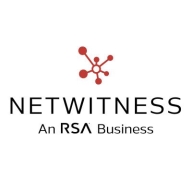

NetWitness NDR and OpenText Core Endpoint Protection compete in the network security sector. OpenText Core Endpoint Protection has the upper hand due to its advanced endpoint security features and user satisfaction in deployment and support.
Features: NetWitness NDR offers real-time threat detection, comprehensive network visibility, and advanced analytics. OpenText Core Endpoint Protection focuses on endpoint security with machine learning-driven insights, extensive control options, and robust threat remediation capabilities.
Room for Improvement: NetWitness NDR could streamline its deployment process, reduce the learning curve, and improve integration capabilities. OpenText Core Endpoint Protection could benefit from pricing adjustments, enhanced dashboard usability, and more detailed reporting options.
Ease of Deployment and Customer Service: OpenText Core Endpoint Protection provides seamless deployment and strong technical support, ensuring a quick operational start. In contrast, NetWitness NDR, while detailed in guidance, presents a steeper learning curve, affecting ease of use.
Pricing and ROI: NetWitness NDR is noted for cost-effective network monitoring, but OpenText Core Endpoint Protection, despite a higher price, offers enhanced security features, leading to a compelling ROI due to its comprehensive protection.
| Product | Market Share (%) |
|---|---|
| OpenText Core Endpoint Protection | 1.2% |
| NetWitness NDR | 0.6% |
| Other | 98.2% |
| Company Size | Count |
|---|---|
| Small Business | 10 |
| Midsize Enterprise | 2 |
| Large Enterprise | 5 |
| Company Size | Count |
|---|---|
| Small Business | 35 |
| Midsize Enterprise | 2 |
| Large Enterprise | 2 |
Using a centralized combination of network and endpoint analysis, behavioral analysis, data science techniques and threat intelligence, NetWitness NDR helps analysts detect and resolve known and unknown attacks while automating and orchestrating the incident response lifecycle. With these capabilities on one platform, security teams can collapse disparate tools and data into a powerful, blazingly fast user interface.
OpenText Core Endpoint Protection offers cloud-managed endpoint security with AI integration, providing real-time protection and lightweight performance. It ensures low system impact, seamless cloud integration, and cost-effective security solutions for various devices.
OpenText Core Endpoint Protection is a comprehensive endpoint security platform utilized by managed-service providers for antivirus and firewall functionality across servers, workstations, and mobile devices. It employs AI for robust threat detection, integrating with cloud applications for real-time updates. Multi-layered security features include malware protection, network defense, and DNS protection. Although connectivity and threat reporting need improvement, this platform extensively supports remote device management and integrates efficiently with Active Directory policies.
What are the key features of OpenText Core Endpoint Protection?OpenText Core Endpoint Protection finds application in industries requiring stringent data protection and peace of mind over device security. Managed-service providers implement this for comprehensive antivirus and firewall features, safeguarding multi-device networks. It is particularly useful for DNS protection and integrating with Active Directory policies, enabling secure yet flexible operations across sectors.
We monitor all Endpoint Protection Platform (EPP) reviews to prevent fraudulent reviews and keep review quality high. We do not post reviews by company employees or direct competitors. We validate each review for authenticity via cross-reference with LinkedIn, and personal follow-up with the reviewer when necessary.